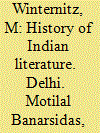| Srl | Item |
| 1 |
ID:
168942


|
|
|
|
|
| Summary/Abstract |
The teaching of science to undergraduates aligns poorly with the practice of science, leading many students to conclude that research is boring and researchers themselves are antisocial geniuses. Creativity, a key driver of scientific progress, is underemphasized or ignored altogether in many classrooms, as teaching focuses on the complex integrated concepts and voluminous amounts of information typical of STEM curricula. Faculty, largely untrained in science education per se, teach largely as they were taught, through lectures based in textbooks. This situation could change, and students' understanding of research practice could be fostered relatively easily, if faculty began teaching classes focused on the journal articles they read in their professional lives. In this essay, I outline a novel scaffolded approach to guiding students in a) deciphering the complexities of scientific literature and b) the process of gaining new understanding of who scientists are, what they do, how they do it, and why.
|
|
|
|
|
|
|
|
|
|
|
|
|
|
|
|
| 2 |
ID:
152733


|
|
|
|
|
| Description |
xviii, 758p.hbk
|
| Contents |
Vol. III
Part One: Classical Sanskrit Literature
Part Two: Scientific Literature
(B)
|
|
|
|
|
|
|
|
|
|
|
|
Copies: C:1/I:0,R:1,Q:0
Circulation
| Accession# | Call# | Current Location | Status | Policy | Location |
| 059035 | 891.09/WIN 059035 | Main | On Shelf | Reference books | |
|
|
|
|
| 3 |
ID:
171282


|
|
|
|
|
| Summary/Abstract |
A growing body of research investigates the factors that enhance the research productivity and creativity of political scientists. This work provides a foundation for future research, but it has not addressed some of the most promising causal hypotheses in the general scientific literature on this topic. This article explicates the latter hypotheses, a typology of scientific career paths that distinguishes how scientific careers vary over time with respect to creative ambitions and achievements, and a research agenda based on the preceding components for investigation of the publication success of political scientists.
|
|
|
|
|
|
|
|
|
|
|
|
|
|
|
|